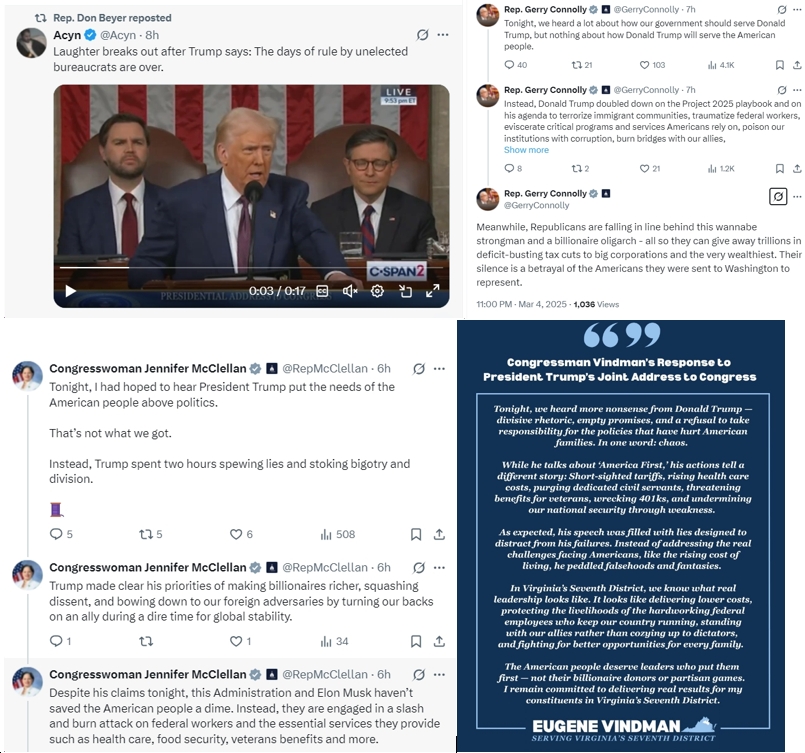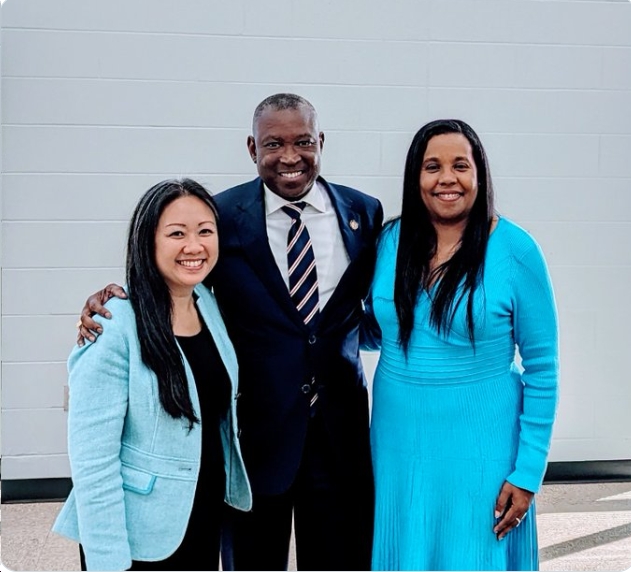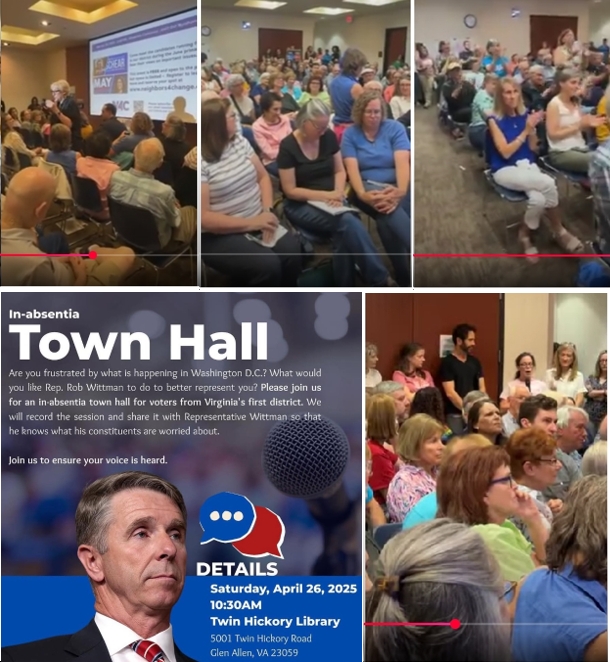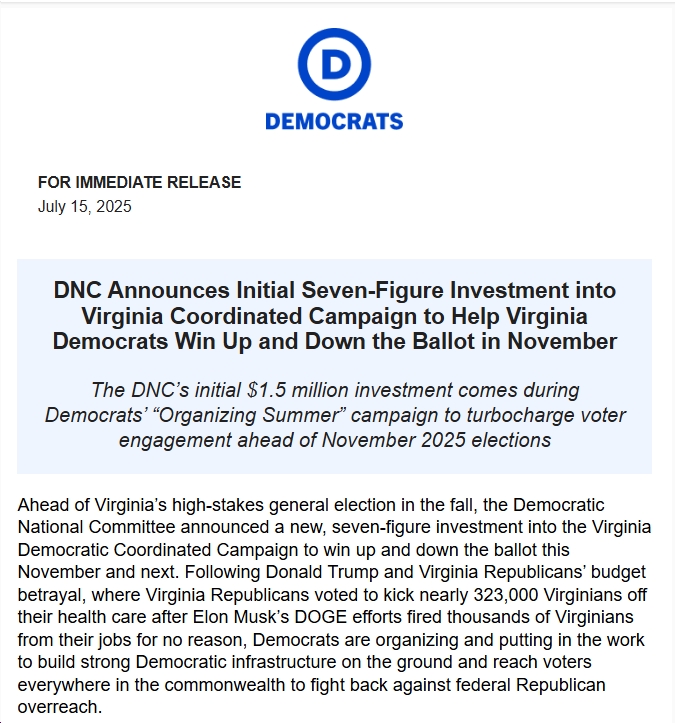Great stuff – and very timely/relevant, given the DNC elections this weekend – from Lt. Governor Northam’s Chief of Staff (and former Democratic Party of Virginia Political Director, Alexandria Democratic Committee Chair, etc.) Clark Mercer. Shared with his permission; bolding added by me for emphasis. Personally, I’d add more on using modern communications technology (e.g., live stream meetings? record everything so that people can watch when they want to/have time to? encourage/train people to use social media effectively?), but this is a great list right here…check it out and please add your comments!
Part 1: A long post.. my two cents on the DNC elections, for what they are worth- put in a bit different context. Systems and organizations/the way we interact have changed drastically over the last couple of decades. See Robert Putnam’s Bowling Alone. The beating heart of the DNC (or RNC) are their local committees, units, whatever one calls them. And any organization predicated on a monthly meeting format- be that a Democratic or Republican committee, NAACP, Masons, Moose Lodge, etc. whatever, have been dying accelerated deaths over the past years unless the way they do business has changed.
You don’t need to join a secret fraternity to give back and volunteer in your community. Likewise, you don’t need to join a local political committee to learn who is running for office, how to meet that candidate, how to give money and get engaged to volunteer. That wasn’t the case decades ago when the Masons, NAACP, committees thrived– you had to show up to a monthly meeting to figure these things out. That is no more. Having new members or volunteers sit through roll calls, secretary reports, and arguing over the treasurer’s report about how you will spend $50 will render these organizations defunct.
We are at a moment in time with our doors being beat down by folks wanting to volunteer. They want to do something. Meetings have to be structured to give members something meaningful to learn and to do. You don’t get a second chance to make a first impression, and if members aren’t engaged, they won’t come back– folks are too busy with work, families, etc.
Now, back to the DNC. The decline in the committee structure and relevance grows exponentially as you go from local committees up to state parties to the national party. Whoever runs the party has to articulate a way to crack the code and get the folks on the ground the resources they need to succeed. Frankly, it has been my biggest disappointment of the past eight years that making a revamped DNC was not a priority. There are no two ways around that, and there were very obvious ways to make this happen (hint hint, OFA).
I haven’t followed the DNC chair elections closely enough to say whether anyone “gets it”, but I have heard and read enough from Adam Parkhomenko , Yasmine Taeb, and Susan Swecker to know that they do.
I could continue this post for quite some time with specific prescriptions for what can be done to revamp the Party structure, though perhaps that will be for another time.
Part 2: How can committees and the DNC be revamped. Here are a few ideas of the top of my head:
1. Committees in heavily Democratic areas need new leadership every 4-6 years. Where we have deep benches, we need to make room for new players to get playing time. From committee chairs to precinct captains, it is not an affront to anyone who has been serving for a long time, but you aren’t injecting new ideas and leadership if you aren’t getting new leaders on board. And I cannot understand why membership at local committees is capped– it’s literally forcing folks to go outside the committee structure to be engaged.
2. In a sense, all committees are not equal and should have specific, tailored targets to hit, and resources given to hit them. If you are in a heavily blue area, winning an election is not enough- it’s about turnout. If you are in a deep red area, you could be doing quite well if you are improving by putting local folks on boards, commissions, winning at the local level, and improving the margins of defeat. We have let some committees in very blue areas go unchallenged for years because the locality goes blue so everyone assumes they are doing their jobs, and not giving enough credit to committees in tough areas that are making big improvements that go unnoticed (I’d suggest that after ’16 this assumption and way of dong business should be challenged, esp. when you look at performance in some key states…). I would argue we have some committees in red areas doing a better job than those in blue areas but we don’t have any metrics or measurable tools to use to demonstrate this (or if we do we don’t share them). DNC needs to give state parties specific goals and targets (like I could use a cool word for this- a dashboard!) and local committees need to be given the same goals by their state party.
3. Resolutions- need to be tied to action. If a committee wants to pass a resolution, what is their plan for communicating it and working to see it be a reality? Too often resolutions are passed and nothing more is done- that is a bad use of time. Resolutions should be limited (w/ the exception of emergency ones and memorial resolutions) to a defined number of meetings a year with a requirement that an action plan be included with them. People join committees for different reasons and the majority of folks don’t join to debate resolutions- but often times significant time is given every month to them, with the same select few being engaged with them, with the rest of the members detached and uninterested. They have a role, but it’s one of many, for a committee- and they have to have an action plan behind them.
4. Committees need to understand their roles/ where there are clear spaces they can make the most impact. Too often, committees want to be all things to all campaigns. The bigger the campaign, the more likely they will have staff and resources; the smaller the campaign, the less likely they will know what is going on. Committees (and campaigns!) need to learn how to complement one another in more effective ways. The state party isn’t going to run the presidential election, not going to happen. The presidential campaigns (and other larger ones) need to respect and plug into the local infrastructure and not reinvent the wheel. But, where I am going with this is local elections. That is where local and state committees need to step up and focus. School board, city council, water and soil conservation districts, and the tough House of Delegates and Senate districts- those are the races the state parties need to focus on and win. We’ve been wiped out at the local and statehouse level over the last 8 years— and that is where we find the bench for the bigger races.
5. Large campaigns need to have a more genuine respect for local stakeholders. Too often across the spectrum in politics, the world is black and white. Local committees and state parties are great and the be all, end all, or they are worthless- that is the feedback you get depending on who you ask. The truth is always somewhere in the middle. Some committees are doing great, some are not, so that’s why they all need support. And it is incredibly frustrating to see parallel efforts in localities with committees working to perform a function, and a campaign come in and do the same, separately. Once that campaign ends, the program they have developed and all the knowledge gained with it, moves on. We have to do a better job creating synergy AND realizing that campaigns can’t be expected to build a local committee for that locality. A lot of this comes down to attitudes and respect.
6. If you don’t need a meeting, don’t hold one. Have a committee host a phone bank, knock doors, or work at a soup kitchen. It drives people crazy to have a meeting “for the sake of having one because we have to have one every month”. Just because it’s a tradition, doesn’t mean it’s good or makes sense.
7. Break your meetings up with action items. At the DNC this weekend, how cool would it be if the states were challenged to see who could put the most calls into the special senate election in Delaware- what’s more, what if members were forced during the agenda to go to breakout rooms and make calls? Lots of ways to do this from letters, note cards, care packages for our soldiers, but make sure every member can point to something actionable they did at your meetings.
8. Caucuses- could write a book on this. Not enough to have a Black Caucus or a Veterans Caucus in name only. Caucuses are where we could be making huuuuge gains if we focused more on membership recruitment and action items. At least at the state level, we don’t enforce our own by-laws to make sure the caucuses are growing and have action plans. Or resources to achieve them. Every year candidates need the same things- roster of small business owners, veterans, etc. across the state- the caucuses are the institutional knowledge for this and not given nearly enough attention.
9. Professional training and longevity at the state parties and DNC. Staff typically aren’t paid well, there is little to any professional development, and it’s a rotating carousel of staff. You can’t build anything meaningful unless you hire good staff and keep them for longer periods of time. See #8— it’s staff’s job to make sure caucuses are doing their jobs; there is little incentive for a caucus or committee chair to listen to a staffer when it’s clear that staffer will be gone likely within a year.
10. To #9, committee leadership has to back their staff up. Staff can’t get committee structures fundamentally changed if they don’t have leadership’s support.
11. To #10, leaders at the DNC and in state parties (and local ones) are typically risk averse to take on real change if that person also has political ambitions to get elected. After all, you don’t want to tick off the party leadership that you’ll need to help you win a caucus, convention, or primary…. am I right? So, while there are always exceptions to the rule, you need chairs willing to shake things up and not being elected or having elected ambitions can be helpful in doing so.
12. All candidates w/ a D next to their names should have assistance from the Party- and that assistance should be well defined. Website, template for a mailer, a call sheet template and tutorial on how to raise money, etc. There are some basics all our Delegate, local, Senate candidates should receive. Re: money and contributions– the caucuses and party need to be honest and upfront about how campaigns are funded and what a campaign should expect to be getting and from whom- no candidate should get into a race with the expectation a big check is coming from some larger entity of the party if that’s not a thing that will happen. That’s fine, by the way, but candidates at a minimum should get some package of resources and clarity about what they are getting into.
13. Don’t be standoffish and hesitant to partner with other groups- there are lots of allied groups and new organizations popping up that are natural partners for our committees. Too often they are seen as threats as they are building their own memberships- but we are not seeing the forest for the trees- if our goals generally align, don’t be nervous to partner and maximize efforts.
14. Committees in deep blue areas need to get out of their blue districts and go help knock doors and call voters in purple and red districts. Some of this is happening organically, and it’s great, but needs to be more of a priority. And it wouldn’t be a bad idea for folks to be more willing- and encouraged- to move into purple districts and flip some of these districts.
15. Membership….members in good standing… ok, that needs to be evaluated differently beyond showing up to the regular monthly meeting. Credit for showing up to phone banks, door knocking, etc. needs to be credited just as is showing up to the monthly meeting. In some committees, you can get kicked out if you miss a certain number of meetings, while at the same time you could be knocking doors everyday for the candidates in your area- credit should be given for doing stuff (that’s a technical term btw).
At any rate, some random thoughts on how to revamp our committees.


















